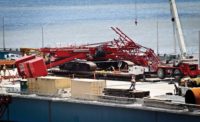The search for answers continues in the Jan. 15 collapse of a 1,500-ft-long cable-stayed bridge in a mountainous region of central Colombia, killing 10 construction workers and injuring several others.
According to reports, the Chirajara Viaduct, which spans a 900-ft-deep canyon on a highway route between Bogota and Villavicencio was approximately 260 ft from being joined at its midpoint when the incident occurred. Welders employed by subcontractors to Bogota-based infrastructure concessionaire Coviandes were performing drainage work around noon when the western side of the structure and its support pylon gave way. The fall into the canyon killed nine workers instantly; the tenth died at a nearby hospital.
An engineer with knowledge of the project says the reported nature of the collapse suggests a structural failure of either the bridge superstructure or of the foundation that supported the fallen tower. Unconfirmed reports claimed that most of the project’s workers were attending a safety briefing off the bridge when the collapse occurred.
The National Infrastructure Agency of Colombia has launched an investigation into the collapse, engaging the services of Mexican civil engineer Jesús Manzo Suarez, who, according to the agency, is an “expert on the construction of bridges and viaducts, and recognized global authority on cable-stayed structures.” Suarez will lead a 30-member team charged with collecting and analyzing field data and documentation on the bridge, with an initial report on the investigation’s initial findings scheduled to be issued January 31, according to an agency statement.
Coviandes is primarily owned by billionaire Luis Carlos Sarmiento, reportedly Colombia’s richest person. According to its website, the company has performed operations and maintenance for the 53.4-mile Bogota-Villavicencio route since 1994. In 2010, Coviandes was contracted to upgrade the route through the scenic Chirajara region with a “dual carriageway and bridges” as part of Colombia’s massive “4G” infrastructure program.
According to the engineer, several bidders elected not to pursue the project, citing the area’s poor soil conditions. The area has a history of unstable ground, including a 1974 landslide that killed 200 people.
In a statement expressing condolences to the families of the affected workers, Coviandes expressed its willingness to “meet any requirement” of the authorities.






Post a comment to this article
Report Abusive Comment